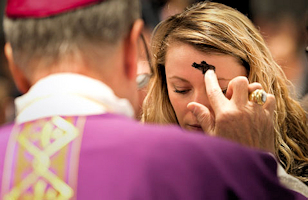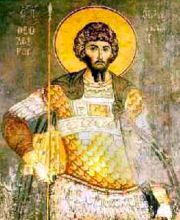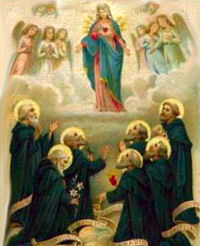Lent: February 17th
Saturday after Ash Wednesday; Optional Memorial of the Seven Holy Founders of the Servite Order
Other Commemorations: St. Theodore Tiro, Martyr (RM)
» Enjoy our Liturgical Seasons series of e-books!
Not only fasting, private prayer, and almsgiving, but also corporate worship helps to form the thorough Christian. All worship centers in Christ, the one mediator. His presence and priesthood are the hope of the world Through Him as their Head, all His members give the Trinity due homage, thanksgiving, and reparation. By worshiping together, men express their dependence upon one another and deepen their vital unity.
"Do not be amazed at this, because the hour is coming in which all who are in the tombs will hear his voice and will come out, those who have done good deeds to the resurrection of life, but those who have done wicked deeds to the resurrection of condemnation (Jn. 5:28-29)."
Today the Church honors the Seven Holy Founders of the Servite Order, seven noble Florentines who in the thirteenth century (1240), at a time when Florence and all Italy was torn by civil strife, banded together to found, not far from Florence on Monte Senario, the Order of Servites of the Blessed Virgin Mary, especially dedicated to penance and meditation on the sorrows of our Lady in the passion of our Savior. This order was approved by the Holy See in 1304. One of the seven, Alexis Falconieri, died on this date in 1310.
The Roman Martyrology also commemorates of St. Theodore Tiro (d. 319), a Christian soldier and martyr of Asia Minor.
Meditation on the Gospel, Luke 5:27-32
The Pharisees expressed astonishment to the disciples that their master ate with sinners. Christ then asserts that he has come for the sake of the sick and the sinners, not the healthy or the just (vv. 12-13).
Doubtless the "just" he has in mind are those incapable of transcending the conventional notion of distributive justice and recognizing God's mercy. Their attitude is that of the workers in the vineyard (Mt 20:1-16), or of the elder son who resents his father's generosity to the prodigal son (Lk 15:11-32), or again of the Pharisees who fulfills all justice to the smallest mite but resents the sinner seeking divine mercy (Lk 18:9-14). He is actually opposing to a religion constructed on human justice one that depends on divine mercy. When he cites Hosea 6:6 (v.13) he is pointing out that the prophets had already questioned the value of ritual, even perfectly executed ritual, as against a religion of love and mercy.
The numerous meals taken by Jesus with sinners, the father’s pardon for the prodigal which takes the form of a sumptuous banquet (Lk 15:22-24), Jesus’ attitude to Judas at the Supper (Mt 26:20-25), his anxiety to offer the bread and wine for the remission of sins (Mt 26:28), are a clear demonstration of the early Christian concept of the Eucharist as a sacrament of pardon (Mt 18:15-18). An overly specialist theology of the Eucharist and of penance has tended to render obscure the link between the two sacraments. Penance actually derives its efficacy from the Eucharist. Any theology of penance which makes it a purifying rite preparatory to the Eucharist, on the basis that the Eucharist itself is not in essence a rite of pardon, lessens the value of both sacraments. When the father assembles his family at a meal and communicates his own life to them, does not that simple gesture include pardon? Our great theological and pastoral need is eucharistic celebration which will be once more "for the remission of sins."
—Guide for the Christian Assembly, Thierry Maertens and Jean Frisque
Shrove Tuesday
The day before Ash Wednesday is a celebration marking the start of the penitential season of Lent. Before Lent — a time of prayer, fasting and penance through a period of 40 days until Easter — Catholics and others celebrate with festivities known by several names.
In the United States, it’s most commonly known as Mardi Gras, French for Fat Tuesday. The tradition includes consuming foods containing animal fat before the beginning of Lent. Catholics enjoy a day of festivities, sometimes hosting their own carnivals or parties. The largest Mardi Gras celebration in the United States takes place in New Orleans. The celebration is known as Carnival in other parts of the world.
Catholics also prepare for Lent by spiritually removing themselves of sin through the Sacrament of Reconciliation. That is why this day is also referred to as Shrove Tuesday, from the old English word shrive, meaning to confess all sins.
Some countries, including England and Ireland, celebrate Pancake Day by consuming what else — pancakes. For centuries, it’s been a tradition to eat pancakes or other foods made with butter, eggs and fat, which would be given up during Lent.
No matter what it’s called, the day before Lent is a reminder of the sacrifice that is to come in the next 40 days. We also are reminded of the sacrifices Jesus made as he fasted and prayed for 40 days after his Baptism and before the beginning of his ministry.
Catholics are called to fast, pray and confess sins during this penitential season. For more ideas on making a good Lent, see Recipes and Activities for Mardi Gras.
—Excepted from the Archdiocese of St. Louis.
 Meditation: Preparing for Lent
Meditation: Preparing for Lent
No Lent is worthy of the name without a personal effort of self-reformation, of leading a life more in accordance with God's commands and an attempt by some kind of voluntary self-denial to make reparation for past negligence. But the Church, together with the personal effort which she requires of all of us, her children, sets up in the sight of God the cross of Christ, the Lamb of God who took upon Himself the sins of man and who is the price of our redemption. As Holy Week approaches the thought of the passion becomes increasingly predominant until it occupies our whole attention, but from the very beginning of Lent it is present, for it is in union with the sufferings of Christ that the whole army of Christians begins on the holy "forty days", setting out for Easter with the glad certitude of sharing in His resurrection.
"Behold, now is the acceptable time, behold, now is the day of salvation." The Church puts Lent before us in the very same terms that formerly she put it before the catechumens and public penitents who were preparing for the Easter graces of baptism and sacramental reconciliation. For us, as it was for them, Lent should be a long retreat, one in which under the guidance of the Church we are led to the practice of a more perfect Christian life. She shows us the example of Christ and by fasting and penance associates us with his sufferings that we may have a share in His redemption.
We should remember that Lent is not an isolated personal affair of our own. The Church avails herself of the whole of the mystery of redemption. We belong to an immense concourse, a great body in which we are united to the whole of humanity which has been redeemed by Christ. The liturgy of this season does not fail to remind us of it.
This, then, is the meaning of Lent for us: a season of deepening spirituality in union with the whole Church which thus prepares to celebrate the Paschal mystery. Each year, following Christ its Head, the whole Christian people takes up with renewed effort its struggle against evil, against Satan and the sinful man that each one of us bears within himself, in order at Easter to draw new life from the very springs of divine life and to continue its progress towards heaven.
—Excerpted from The Saint Andrew Daily Missal
Highlights and Things to Do
- Today is Fat Tuesday, or Mardi Gras! Try some of the traditional recipes linked here. When eggs were among the foods that were forbidden by the Church during Lent, people would use them up on Fat Tuesday by mixing up large quantities of pancakes or doughnuts (also known as fastnachts).
- Read Maria von Trapp's explanation of the traditions associated with Carnival, or Fat Tuesday here.
- Sing this American favorite, Turkey in the Straw, with your children as part of your Mardi Gras celebrations.
- Discuss Jesus' Gospel teaching for today, He who would be first must be last, with your children and ask them how they can put others in the family before themselves. Keep it simple and practical — setting the table, washing the dishes, folding laundry, watching the littler ones, doing homework right away.
- What does it mean to become a child spiritually, that we may enter Heaven and be received by Christ Himself? We can learn much from St. Therese of the Child Jesus about spiritual childhood. Begin reading her autobiography, Story of a Soul. ICS Publications with John Clark, OCD's critical edition is considered the best.
- Read Fr. William Saunder's article, Shrove Tuesday and Shrovetide, from the Catholic Culture Library.
- Read Jennifer Gregory Miller's two part explanation on Carnival: Carnival Part One: A Season of Contrasts and Carnival: Part Two, the Final Countdown.
Seven Founders of the Orders of Servites
These seven men were the founders of the Servite Order, a community instituted for the special purpose of cultivating the spirit of penance and contemplating the passion of Christ and Mary's Seven Sorrows. Due to the spirit of humility cherished by the members of the Order, their accomplishments are not too widely known. But in the field of home missions great things are to their credit, and certainly they have benefited millions by arousing devotion to the Mother of Sorrows.
The Breviary tells us that in the midst of the party strife during the thirteenth century, God called seven men from the nobility of Florence. In the year 1233 they met and prayed together most fervently. The Blessed Mother appeared to each of them individually and urged them to begin a more perfect life. Disregarding birth and wealth, in sackcloth under shabby and well-worn clothing they withdrew to a small building in the country. It was September 8, selected so that they might begin to live a more holy life on the very day when the Mother of God began to live her holy life.
Soon after, when the seven were begging alms from door to door in the streets of Florence, they suddenly heard children's voices calling to them, "Servants of holy Mary." Among these children was St. Philip Benizi, then just five months old. Hereafter they were known by this name, first heard from the lips of children. In the course of time they retired into solitude on Monte Senario and gave themselves wholly to contemplation and penance. Leo XIII canonized the Holy Founders and introduced today's feast in 1888.
—Excerpted from The Church's Year of Grace, Pius Parsch
Highlights and Things to Do:
- Read more about the Seven Founders:
- In imitation of the Seven Founders, with the aid of the Gospels, meditate on the Seven Sorrows of Mary: the prophecy of Simeon; the flight into Egypt; the loss of the Child Jesus in the temple; the meeting of Jesus and Mary on the Way of the Cross; the Crucifixion; the taking down of the Body of Jesus from the Cross; the burial of Jesus.
- Learn more about the Order of Servites.
St. Theodore Tiro
 St. Theodore was a Christian soldier who set on fire the temple of the mother-goddess Cybele at Amasea (303 A.D.). The prefect of the legion promised mercy if he repented his act and renounced the Christian faith. Theodore persevered bravely; accordingly he was cast into prison and his flesh ripped by iron hooks so that his ribs were exposed. In the midst of indescribable torture he sang joyfully, "I will bless the Lord at all times; His praise will ever be in my mouth" (Ps. 33).
St. Theodore was a Christian soldier who set on fire the temple of the mother-goddess Cybele at Amasea (303 A.D.). The prefect of the legion promised mercy if he repented his act and renounced the Christian faith. Theodore persevered bravely; accordingly he was cast into prison and his flesh ripped by iron hooks so that his ribs were exposed. In the midst of indescribable torture he sang joyfully, "I will bless the Lord at all times; His praise will ever be in my mouth" (Ps. 33).
Praying and singing the glories of Christ, he was burned alive on November 9. A panegyric by St. Gregory of Nyssa on his virtues is extant. Theodore's head has been venerated at Cajeta since the Middle Ages. In ancient times, particularly among the Greeks, this soldier-martyr was honored as patron of armies. During the seventh century a church was dedicated to him in Rome, and his picture appears upon the apse mosaic in the church of Sts. Cosmas and Damian.
—Excerpted from The Church's Year of Grace, Pius Parsch
Patronage: recovery of lost articles; soldiers; city of Brindisi, Italy; archdiocese of Brindisi-Ostuni, Italy; Venice, Italy
Symbols and Representation: crocodile; crown of thorns; martyr's wreath; post and iron hooks; white horse; temple of Cybele in flames; cross; Roman armor; sword; palm; pyre; soldier; spear; temple; torch
Highlights and Things to Do:
- Well might we marvel at the heroic courage St. Theodore showed in the midst of pain. While suffering horribly he sang songs of praise! And we are so frightened by the smallest ache and become uncomfortable at the very mention of suffering! God does not ask such suffering from us as He did from Theodore, yet He asks that we accept some troubles patiently. If we have any discomfort today, let us offer it up without complaint.
- Read more about St. Theodore:
- Remember our soldiers and say a prayer for them.
- Read what St. Gregory of Nyssa wrote about St. Theodore.
- See the statue of St. Theodore in the St. Peter's Basilica Colonnade.






